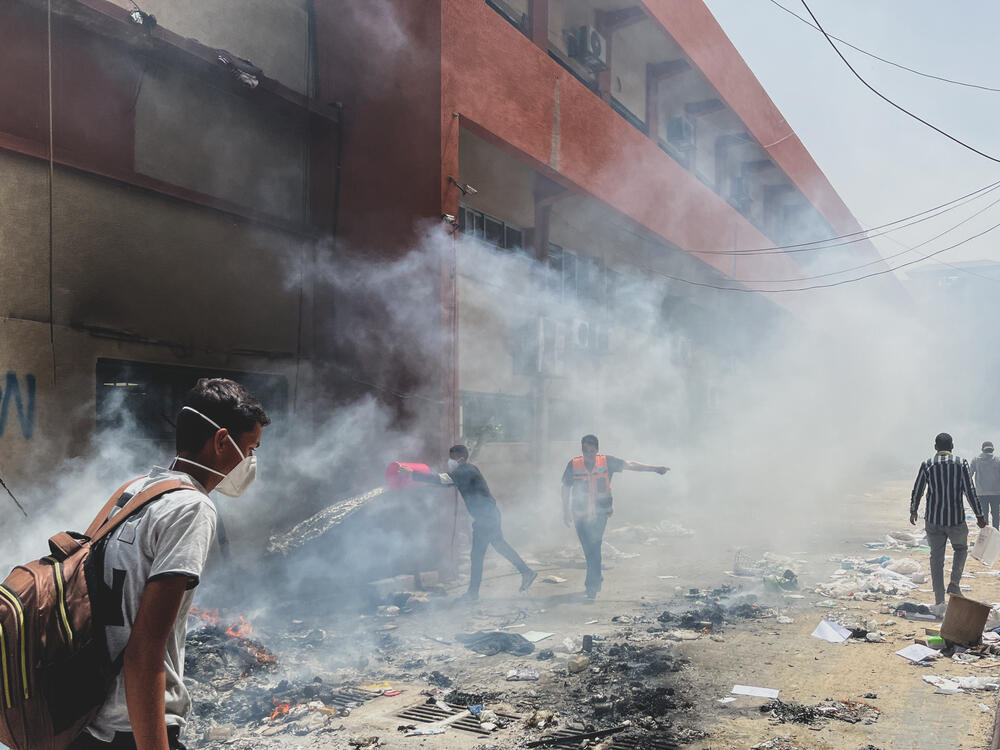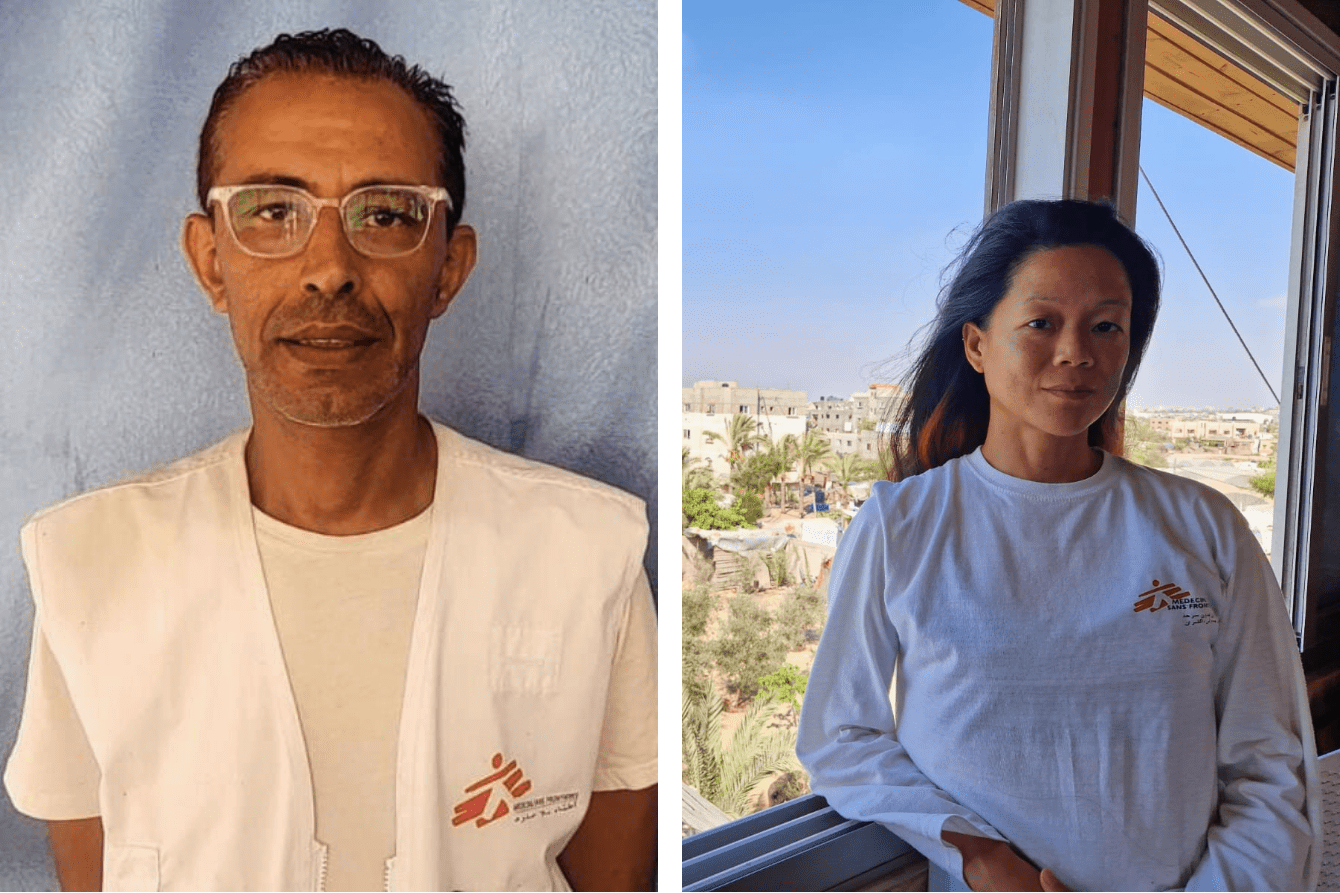Gaza: “I have never seen a mass casualty event like today”
On 13 July, Israeli strikes hit an area in Khan Younis where thousands of people were sheltering. MSF teams at Nasser Hospital treated many of the hundreds wounded in this 'horrific' mass casualty event. Two staff members share their testimonies.
Only a week before, Médecins Sans Frontières / Doctors Without Borders (MSF) warned of the risk of the last comprehensive hospital in south Gaza becoming overwhelmed in case of mass casualty incidents. This disproportionate attack killed and wounded hundreds of people in a place where Israeli forces have repeatedly advised displaced people to go, showing a complete disregard for the lives of Palestinians.
“Every space was occupied by the injured or bodies of the dead”
Dr Mohammad Abu Mughaiseb, MSF deputy medical coordinator in the trauma and burn unit, Nasser Hospital
"While we were having our break in the backyard of Nasser Hospital, we suddenly heard three heavy airstrikes, which shook the whole hospital. In 15 minutes, we could hear the ambulances starting to arrive. Medical teams and MSF teams at the hospital decided to launch a mass casualty plan. They stopped working in the outpatient department and 20 of our medical staff went to support the emergency room.
"The situation was very tense and crowded, and a lot of injured people were arriving.
“Both the intensive care unit and the operation theatre rooms were occupied with no more space”
"In my experience, I have never seen a mass casualty event like today [Saturday 13 July]. Every corner in the hospital was busy. Every space was occupied by the injured or bodies of the dead. The medical staff were working very hard to save lives. Some patients passed away, unfortunately, because of the type of difficult injuries they had. Both the intensive care unit and the operation theatre rooms were occupied with no more space.
"Our anaesthesia doctor and pain specialist was working in our ward. He went to support the emergency room with our team, and he discovered that his family were among the injured who had arrived at the hospital. He lost his nephew, and his daughters were injured. So even our medical staff, while they were working and trying to save patients, were receiving news that their families were among the injured or dead."
“I could see a trail of blood leading to our inpatient maternity ward”
Amy Kit-Mei Low, MSF project medical referent in the maternity and paediatric department, Nasser Hospital
"In the morning, there were airstrikes about 1.5 km from Nasser hospital, where MSF provides care to patients. We work in the maternity and paediatric department. We felt the building shake and all our staff were visibly concerned about what was going on. They called their loved ones to see what had happened. It was highly populated with markets, water points, and so they were afraid that they had lost family members.
"When I first got to the hospital, they [medical staff] were trying to do chest compressions on a man who had died. According to the doctor, he had suffered traumatic injuries and there was blood in his mouth. We didn't have a suction machine to try to get rid of the blood from his mouth. He died; he was killed.
"The staff were feeling overwhelmed, stressed, concerned for all the patients that we were receiving. There was one little boy with his father there. His father had an injury to his back and the boy was just sitting there looking kind of confused and bewildered, and we felt horrible for that family because I'm not sure that the boy understood that his father was the only surviving member of his family."
Nowhere else to go
"After about five to 10 minutes, there were reports that patients had started to come to our maternity department. I went down to the ground floor, where we have the emergency, paediatric and maternity departments, and I could see a trail of blood leading to our inpatient maternity ward.
"Because we don’t usually receive trauma patients in the maternity and paediatric wards, we were not prepared for this [mass casualty incident]. But the emergency department was so full and overwhelmed that the patients had nowhere else to go.
"Because of the lack of pain medication, we had to give diclofenac injections [an anti-inflammatory drug, not usually used as first option for pain management of trauma cases] [for patients with] traumatic wounds, which clearly weren't enough."
“It was chaotic and quite horrific, and the hospital was trying to cope, but it can already barely cope with normal cases”
"At one point, you just had people in the hallway moaning in pain. Even though they had [wound] dressings, the dressings were oozing blood. It was chaotic and quite horrific, and the hospital was trying to cope, but it can already barely cope with normal cases.
"On a normal day we are already overwhelmed. Nasser Hospital is basically the biggest functioning hospital in this area and has to treat everybody, but it can't treat the whole population. Last week the bed occupancy in the maternity department was at 214 percent, and the maternity department did 25 caesarean sections and some 200 deliveries
"We are over capacity and the quality of care is going down due to the lack of supplies and space. How do you keep the intravenous line clean? How do you do all this if you have no gloves or chlorine? The situation yesterday was horrific."
MSF and the Israel – Gaza war
An unprecedented humanitarian crisis is unfolding in Gaza. MSF teams have worked to treat the wounded and supply overwhelmed hospitals as indiscriminate airstrikes and a state of siege threaten millions of men, women and children.

